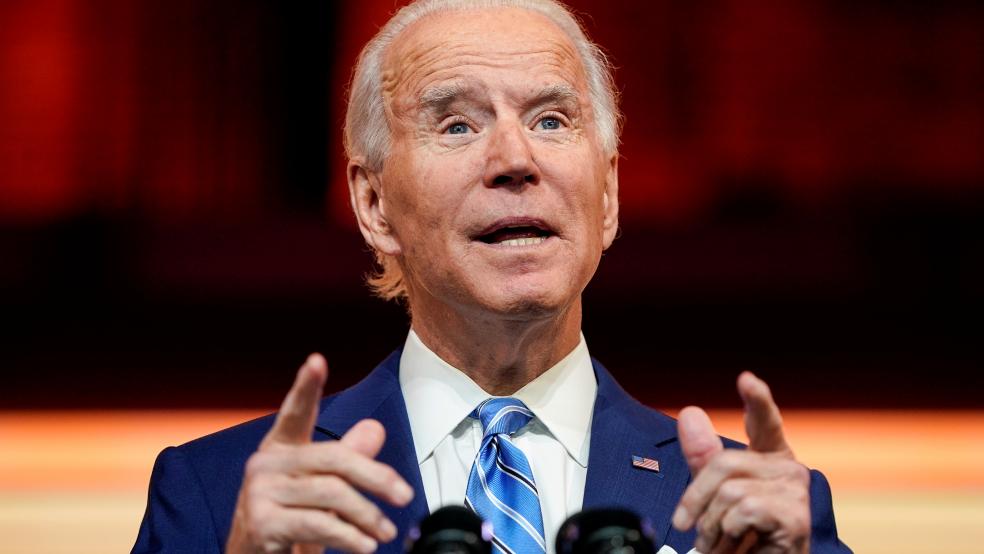President-elect Joe Biden on Thursday unveiled an economic relief package that calls for $1.9 trillion in aid, including money for $1,400 direct payments to most Americans as well as $350 billion in funding for state and local governments and billions more to promote coronavirus testing and vaccine distribution.
Biden is proposing a $400-a-week federal boost to unemployment insurance through September, expanded paid leave and an increase in the child tax credit from $2,000 to $3,000 for this year, with another $600 for children under age 6 and “new rules that would let the poorest households get the full benefit,” according to The Wall Street Journal.
“Aid for households makes up about half of the plan’s cost, with much of the rest going to vaccine distribution and state and local governments,” the Journal’s Richard Rubin and Eliza Collins say.
Here’s a rundown of the elements in Biden’s plan, per Bloomberg News:
- Direct payments of $1,400, on top of the $600 approved in December
- $400 per week in supplementary unemployment benefits through September
- $350 billion for state and local governments
- Raising the minimum wage to $15 an hour
- $130 billion to help schools reopen
- $160 billion in funding for a national program of vaccination, testing and other coronavirus containment efforts
- $30 billion for rental and small-landlord support
- $25 billion for childcare providers
- Expanded food assistance
- Expanded child tax credits
- Expanded medical and family leave
Biden’s plan is broken into two separate packages, with an immediate injection of coronavirus-related “rescue” money to be followed by a proposal for longer-term economic “recovery” focused on jobs and infrastructure. “This legislative package is needed now to address the immediate crises. In the coming weeks, President-elect Biden will lay out his economic recovery plan to invest in America, create millions of additional good-paying jobs, combat the climate crisis, and build back better than before,” the transition team said in its fact sheet.
Biden’s plan doesn’t include cost offsets, relying instead on deficit financing, the Journal reports. “Mr. Biden’s argument is that now isn’t the time to worry about widening budget deficits, given the emergency and low interest rates,” the Journal’s Rubin and Collins write.
Pushing for bipartisan agreement: Biden will try to get Republicans to back his plan — and he’ll need at least 10 Senate Republicans to approve assuming that all 50 Senate Democrats support his proposals. It’s far from a sure bet, given prior Republican opposition to a relief package of this size. The cost of Biden’s plan is more than double that of the hard-fought bipartisan deal passed by Congress last month and approaches the price tag on the Cares Act passed in March. Some Republicans are also likely to resist providing $350 billion in aid to state and local governments and to the minimum-wage hike Biden wants, among other elements, though Democrats reportedly feel confident that they can get 10 GOP votes for a bill that that includes state and local money.
House Speaker Nancy Pelosi (D-CA) and Senate Democratic Leader Chuck Schumer (D-NY) lauded Biden’s plan. “We will get right to work to turn President-elect Biden’s vision into legislation that will pass both chambers and be signed into law,” they said in a joint statement released Thursday. “We echo the President-elect’s call for bipartisan action on his proposal and hope that our Republican colleagues will work with us to quickly enact it.” But some Democrats might still object to elements of the plan, too. Sen. Joe Manchin (D-WV) last week suggested that he would want any additional direct payments to be more targeted.
Rep. James Clyburn (D-SC) told the Journal that he expects the relief package to be broken up based on what can be passed immediately on a bipartisan basis and what may need to go through a process known as budget reconciliation, which would require only 50 votes in the Senate.
Biden’s strategy “will test the president-elect’s legislative savvy, and will force the Democratic Congressional leadership to navigate razor-thin majorities to deliver the administration an early victory,” Punchbowl News says. And the fight over longer-term stimulus may be even more challenging, given that it would involve some tax hikes.





